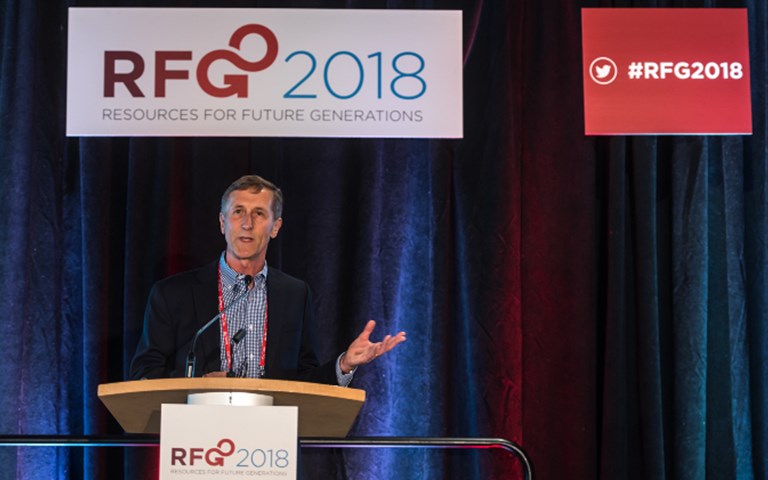John Thompson, chair of RFG’s organizing committee, at the conference's opening ceremony. Jon Benjamin Photography
Long-term planning and sustainable development were the focus at the inaugural Resources for Future Generations (RFG 2018) conference, from June 16 to 21. More than 2,000 people and 50 exhibitors attended the four-day event in Vancouver. The new event aimed to discuss the future of resource management within an interdisciplinary framework by bringing together a wide range of industry professionals and academics.
“When you set out to create something as broad as this and try to delve into problems that cut across many different aspects, it’s always difficult to really draw people together to open up and discuss,” said John Thompson, chair of RFG’s organizing committee. “I think we did that, and there’s a lot more that can be done going forward in the future.”
Daily multidisciplinary plenary sessions brought together miners, environmentalists and social scientists to discuss the future sustainability and stability of natural resources, and the concept of using and recycling resources in a circular economy.
Ross Beaty, the founder and chairman of Pan American Silver, said during the opening plenary session that the current global focus on economic growth above all else is flawed, and that the trend of increasing resource use that many in the industry and government plan for is fundamentally unsustainable. “It’s time to recognize that we can’t assume the growth will continue,” Beaty added.
Tzeporah Berman, an environmental advisor, added in the same session that when it came to the current, and unsustainable, use of resources, “We can no longer plan without acknowledging that we’re living in a warming world,” she said. “We have blinders on when we talk and plan about resource extraction.”
Related: John Thompson talks sustainability, Resources for Future Generations and kids these days
The six streams of technical sessions also looked at sustainable and renewable use of energy, minerals and water, and investigated ways of improving the recycling of resources. Education and social outcomes were also highlighted.
Several of the invited speakers emphasized the importance of appealing to younger generations to help solve the challenges of resource management currently facing the world.
“Because technology is moving along so quickly, students need to learn how to unlearn,” said Richard Chuchla, director of the energy and earth sciences program at the University of Texas-Austin. Chuchla proposed universities start offering multidisciplinary degrees, rather than conventional one-subject programs. He argued such innovative approaches would help students keep pace with a continuously changing world.
Thompson said work on the next conference is ongoing.
“We had some fantastic discussion that was generated. I would argue that we’ve just begun the longer term dialogue,” Thompson said, “and hopefully there will be much more to come in the future.”
With files from Tom DiNardo



